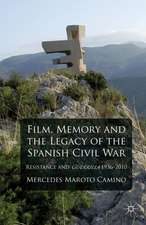An Introduction to Antonio Gramsci: His Life, Thought and Legacy
Autor Dr George Hoare, Nathan Sperberen Limba Engleză Paperback – 18 noi 2015
| Toate formatele și edițiile | Preț | Express |
|---|---|---|
| Paperback (1) | 175.39 lei 6-8 săpt. | |
| Bloomsbury Publishing – 18 noi 2015 | 175.39 lei 6-8 săpt. | |
| Hardback (1) | 509.12 lei 6-8 săpt. | |
| Bloomsbury Publishing – 18 noi 2015 | 509.12 lei 6-8 săpt. |
Preț: 175.39 lei
Preț vechi: 201.15 lei
-13% Nou
Puncte Express: 263
Preț estimativ în valută:
33.56€ • 36.45$ • 28.19£
33.56€ • 36.45$ • 28.19£
Carte tipărită la comandă
Livrare economică 23 aprilie-07 mai
Preluare comenzi: 021 569.72.76
Specificații
ISBN-13: 9781472572769
ISBN-10: 1472572769
Pagini: 272
Dimensiuni: 138 x 216 x 18 mm
Greutate: 0.5 kg
Editura: Bloomsbury Publishing
Colecția Bloomsbury Academic
Locul publicării:London, United Kingdom
ISBN-10: 1472572769
Pagini: 272
Dimensiuni: 138 x 216 x 18 mm
Greutate: 0.5 kg
Editura: Bloomsbury Publishing
Colecția Bloomsbury Academic
Locul publicării:London, United Kingdom
Caracteristici
Gives coverage to most important aspects of Gramsci's thought, his legacy and contribution to historical methodology
Notă biografică
George Hoare is an independent researcher and co-host of the Bungacast podcast. His books include The End of the End of History: Politics in the Twenty-First Century (2021; with Alex Hochuli and Philip Cunliffe) and Taking Control: Sovereignty and Democracy after Brexit (2023; with Philip Cunliffe, Lee Jones, and Peter Ramsay).Nathan Sperber is a sociologist based in Paris and an associate of the European Center of Sociology and Political Science of the Sorbonne (CESSP), France.
Cuprins
IntroductionPart I - Life 1. Antonio Gramsci, 1891-1937Part II - Thought 2. Culture3. Politics4. Philosophy5. HegemonyPart III - Applications6. Thinking through Gramsci in Political Theory: Left/Right and the critical analysis of common sense7. Thinking through Gramsci in Political Economy: neo-liberalism with and without hegemony in Britain and France in the 1980sPart IV - Legacy 8. Mapping Gramsci's legacyFurther ReadingBibliographyIndex
Recenzii
George Hoare and Nathan Sperber have produced a modern, methodologically consistent introduction to Antonio Gramsci, his thought and legacy; an excellent guide to interdisciplinary Gramscian studies.
Hoare and Sperber have written a fantastic book that will appeal to both experts of Gramsci and those newly interested in him alike ... The book not only offers a well-written account of his life and thought to refer to in future work, but more importantly, two challenging chapters presenting a new way of applying Gramsci's approach to contemporary issues ... A great basis for anyone who wants to engage with Gramsci's concepts and methods.
[This book] provides a helpful ... introduction to Gramsci's writings ... the section on education [is] particularly interesting, as this is an area often overlooked in other books on Gramsci ... For a student undertaking a university course where the thoughts of Gramsci are discussed directly, or applied obliquely to a particular discipline, Hoare and Sperber's book will prove a useful ... introduction.
This valuable overview of Gramsci's political thought supplies an engaging, accessible and contextually informed account of its evolution and architecture. It serves both as an introductory guide, and as a fresh critical evaluation of his ideas. Its authors make a strong case for the integrated character of his ideas, highlighting his distinctive, historically informed method of social analysis. And they offer a thoughtful assessment of the continuing relevance of his intellectual methodology for those working in the fields of political theory and political economy.
After a long hiatus in the eighties and nineties, the Gramsci literature in English is booming. The power of his ideas and example never went away, from the intensities of the earliest reception in the 1970s to their capillary circulation across the long onset of the neoliberal new times, but the direct commentaries are now proliferating once again. George Hoare and Nathan Sperber offer an excellent guide through those increasingly elaborate discussions. Their new Introduction is lucid, economical, comprehensive, and international -- critical in the very best of ways.
Hoare and Sperber have written a fantastic book that will appeal to both experts of Gramsci and those newly interested in him alike ... The book not only offers a well-written account of his life and thought to refer to in future work, but more importantly, two challenging chapters presenting a new way of applying Gramsci's approach to contemporary issues ... A great basis for anyone who wants to engage with Gramsci's concepts and methods.
[This book] provides a helpful ... introduction to Gramsci's writings ... the section on education [is] particularly interesting, as this is an area often overlooked in other books on Gramsci ... For a student undertaking a university course where the thoughts of Gramsci are discussed directly, or applied obliquely to a particular discipline, Hoare and Sperber's book will prove a useful ... introduction.
This valuable overview of Gramsci's political thought supplies an engaging, accessible and contextually informed account of its evolution and architecture. It serves both as an introductory guide, and as a fresh critical evaluation of his ideas. Its authors make a strong case for the integrated character of his ideas, highlighting his distinctive, historically informed method of social analysis. And they offer a thoughtful assessment of the continuing relevance of his intellectual methodology for those working in the fields of political theory and political economy.
After a long hiatus in the eighties and nineties, the Gramsci literature in English is booming. The power of his ideas and example never went away, from the intensities of the earliest reception in the 1970s to their capillary circulation across the long onset of the neoliberal new times, but the direct commentaries are now proliferating once again. George Hoare and Nathan Sperber offer an excellent guide through those increasingly elaborate discussions. Their new Introduction is lucid, economical, comprehensive, and international -- critical in the very best of ways.









